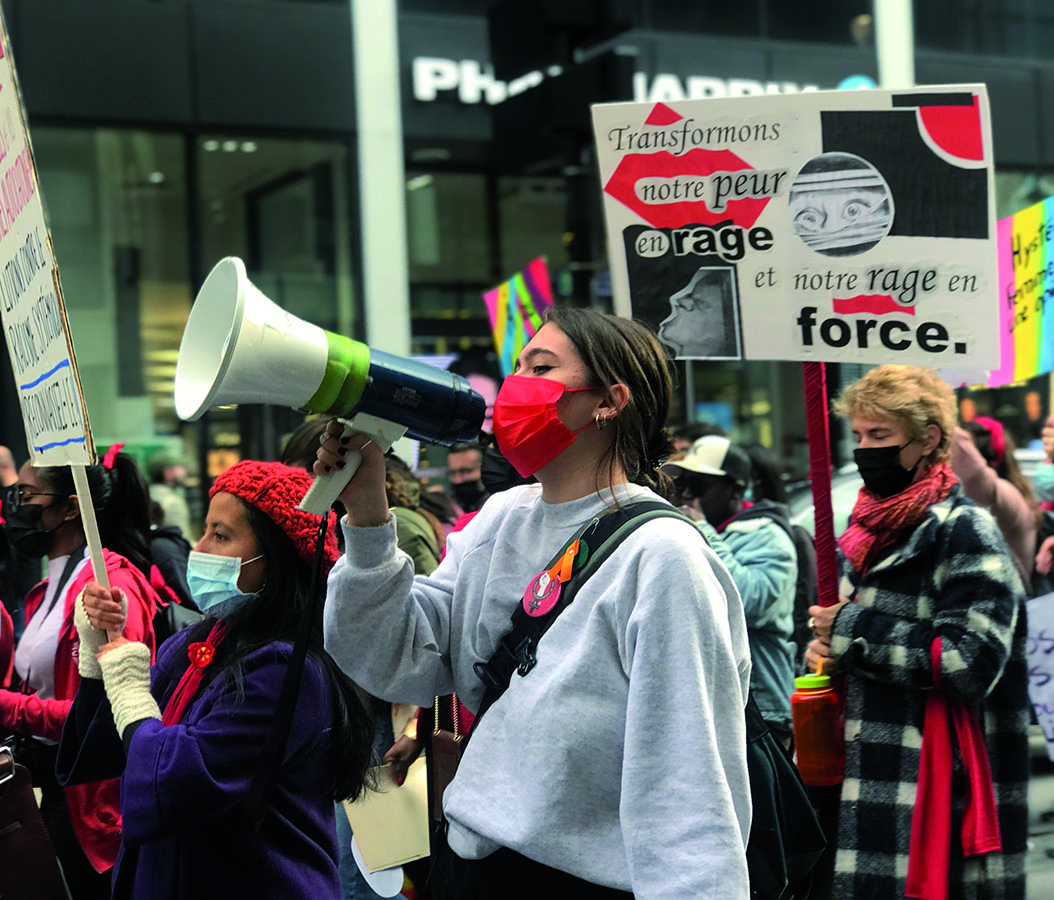Marchers chanted “Equity is Possible through Diversity” as this year’s focus was on the rights of Indigenous and marginalized women
Montreal’s Coalition of the World March of Women (WMW) held a march this Sunday Oct.17, concluding the fifth international action which, this year, emphasized the rights of Indigenous women.
Marchers wore red, a symbol that shows solidarity for missing and murdered indigenous women and girls. Red scarves were given out by event organizers at Cabot Square Park before the march departed at 1 p.m.. The crowd chanted “Equity is possible through diversity” during the speeches, right before taking off for the march.
Protesters of all ages, backgrounds and genders chanted and marched down Saint-Catherine Street to the beat of hand-held drums.
The WMW was a feminist movement that initiated in Quebec after the Bread and Roses march in 1995 to combat the growing impoverishment and violence against women.
The movement was “born of the desire to unite women of the world around a common project,” as stated on the official WMW website, and grew to “an international feminist action movement connecting grass-roots groups and organizations working to eliminate the causes at the root of poverty and violence against women.”
The first international action happened in 2000 and has since occurred every five years. Beginning on March 8, International Women’s Day, and closing on Oct. 17, the International Day for the Eradication of Poverty, the WMW holds a series of events to put forward and raise awareness for their demands.
The fifth action was projected to take place in 2020, but the Coordination du Québec de la March mondiale des femmes (CQMMF) decided to postpone it due to the pandemic.
The WMW regroups activists and women’s groups in Montreal. But, it is also just one part of a global movement. Diana Lombardi, coordinator for Réseau d’action des femmes en santé et services sociaux, an umbrella group for women’s groups in Montreal, explained: “When we sit down and think about what themes to bring up for the march, we ask ourselves: how can what we are doing in Montreal support and make space for women’s voices who are less heard?”
Nakuset, executive director of the Native Women’s Shelter of Montreal, highlighted why the WMW is fighting for Indigenous women’s rights. “We’re still facing no clean water in Iqaluit, we’re still facing missing and murdered Indigenous women, we’re still facing poverty, we’re still facing homelessness, we’re still facing our children being apprehended in youth protection.”
“We learned this summer that there are over 6500 children in mass graves, therefore we need your help,” she said.
This year’s march was organized around five major themes: a strong sense of solidarity and the demands of indigenous women, poverty, violence against women, climate justice, and the rights of immigrant, racialized, and migrant women.
Lombardi was also on Montreal’s WMW coordinating team for this year’s actions. “Our goal is to speak more to the population that it is possible to make changes […] and what we are suggesting is good for all communities, not just a few. We are thinking of a society with less violence, cleaner spaces, less poverty, and a place for all people” said Lombardi. “How can we not fight for that?”
The poverty theme assesses the growing impoverishment of women by asking decent livable wages. “The housing crisis in Montreal is making it harder for women to come out of poverty, which makes accessing clean and affordable housing more difficult,” said Lombardi.
Montreal’s Rental Market Report for 2020 highlighted that the average rental prices on the Island of Montreal went up 4.2 per cent in 2020, which has been the largest increase since 2003.
The WMW is also demanding more recognition of violence against women. Femicide has been discussed by Quebec media more than ever since the start of the pandemic. In 2021, 16 women in the province of Quebec were reported murdered through acts of domestic violence, with an alleged 17th case on Monday.
Lombardi adds, “the housing crisis in Montreal is not helping women who are experiencing domestic or interpersonal violence looking for a safe place to be.”
She also notes that immigrant, racialized, and migrant women “who might not have high status” and “who are trying to be included in Montreal and in Montreal’s society” are failing to be noticed by the city.
“Can we recognize that we have a problem with systemic racism?” she asked.
Photograph by Lou Neveux-Pardijon




